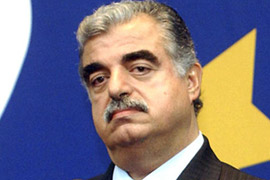Beirut talks call for Lebanon unity
Bashar al-Assad and King Abdullah attend talks aimed at reducing al-Hariri probe tensions.

“The leaders stressed the importance of stability … the commitment [of the Lebanese] not to resort to violence and the need to place the country’s interests above all sectarian interests,” said a communique issued by the Lebanese presidency following the talks.
The statement also stressed the need to “resort to legal institutions and Lebanon’s unity government to resolve any differences”.
Asked about the outcome of the meeting as he left the presidential palace, al-Assad gave a thumbs up and said: “The discussions were excellent.”
Rula Amin, Al Jazeera’s correspondent in the Lebanese capital, said the joint visit was hugely symbolic.
“These two leaders coming together to Beirut shows the urgency, it shows that they realise the dangers that are lying ahead for Lebanon,” she said.
Hezbollah anger
Reports are circulating in Beirut that the UN tribunal is about to indict members of Hezbollah, an armed Shia political movement with close ties to Syria, prompting an angry response from Hassan Nasrallah, the group’s leader.
Nasrallah’s reaction has raised fears of renewed unrest in Lebanon, where Hezbollah and al-Hariri supporters fought in the streets of Beirut in May 2008, bringing the country to the brink of civil war.
Saad’s mainly Sunni Future Movement has close links to Saudi Arabia and backs the UN tribunal’s investigation into his father’s death.
Speaking to Al Jazeera from Beirut, Kamal Wazne, a political analyst, said: “Anything short of the cancellation of the indictment is going to be a lot of trouble for Lebanon.
“I don’t think there will be a civil war in Lebanon, those days are over, civil war will not be allowed in Lebanon.
“But I think there will be measurement taking, I think, by the resistance and by Hezbollah and this is going to cause some havoc for Lebanon.”
The visit of the Saudi and Syrian leaders, who arrived on a Saudi aircraft from Damascus, lasted for only a few hours.
It included a lunch attended by some 250 officials, among them members of the unity government which includes two Hezbollah ministers.
‘Dangers ahead’
Al-Assad’s presence in particular is highly significant because Syria is believed by many in Lebanon to have been behind al-Hariri’s death.
 |
| Syria is believed by many in Lebanon to have been behind al-Hariri’s death [AP] |
His killing marked a dramatic souring of relations between the two countries, forcing Syria to end its occupation of Lebanon, despite its repeated denials of involvement.
Ties between Damascus and Beirut have improved in recent years, with the two capitals establishing diplomatic ties in 2008.
Al-Assad’s visit to Beirut is seen as further evidence of a diplomatic thaw between the countries at a crucial time.
The Saudi monarch is expected to ask al-Assad to use his influence over Hezbollah to steer the group away from a new confrontation with al-Hariri’s supporters.
Hezbollah has responded positively to the visit.
“The Arab leaders’ visit to Lebanon is an opportunity to show Arab unity in the face of this plot which aims to destabilise Lebanon and sow sedition,” Hassan Fadlallah, a Hezbollah member of parliament, said.
Regional tensions
Rami Khoury, editor-at-large for Lebanon’s Daily Star newspaper, said that the country’s internal politics were linked to wider regional tensions.
“We have very old and very strong links between all the major players in Lebanon and huge regional and international actors,” he said.
“It’s a very complex situation. That’s why all the main struggles in the region are evident here in Lebanon.”
Shadi Hamid, the deputy director of the Brookings Doha Centre, said that the next fortnight in Lebanon will be “crucial”.
“There is a risk of escalation, of sectarian violence, and all players involved realise that risk and are taking pre-emptive action to defuse things before they get out of hand in the next weeks and months,” Hamid said.